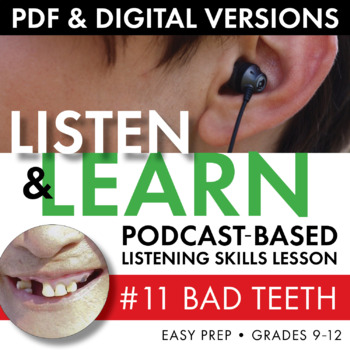Listening Skills Podcast Activity, Listen & Learn #11, PDF & Google Drive, CCSS
- Zip
- Google Apps™

What educators are saying
Description
Students need to be able to sit and listen to a passage or short audio program, take notes, recall information, and then answer critical thinking questions about the material. To help prepare students for our e-learning world, I’ve scoured the internet to find high-interest, school-appropriate podcasts that fit within one class period.
In this Listen & Learn activity, students will listen to a 24-minute podcast focused on how Ryanne Jones’ teeth became a marker of poverty and the years she spent trying to overcome the prejudice her broken smile created. This high-quality podcast presents a compelling, heartfelt narrative and allows the listeners (our students) to draw their own conclusions.
The easy prep lesson materials in this download include:
• A list of suggested lesson procedures for the teacher (or just print and leave for a sub) with several links to use to access the podcast online. Several of these sites also allow users to download the program and keep it on their personal mp3 players, a great option if the internet isn’t always reliable in your classroom. (PDF)
• A handout with questions for students to answer both while they listen and after the program is finished (PDF and Google Drive versions)
• A two-page answer key to make grading easy and to provide talking points as you review answers with your students (PDF)
This lesson, designed for students in grades 9-12, will take about 40 minutes to complete or a bit longer if you review answers/allow students to debate some of the questions. Please note that the language in the podcast is clean and entirely school-appropriate, but the episode does briefly discuss how one job interviewer incorrectly assumed Ryanne Jones used methamphetamine because she was thin and had terrible teeth. It is a brief mention in the episode, but I want to give teachers a heads-up about the element of suspected drug use. The podcast is appropriate for high school students, but you may want to listen to the episode before purchasing. Click here to listen to Jones’ story: https://www.marketplace.org/shows/this-is-uncomfortable-reema-khrais/why-dont-you-fix-your-teeth/
Want another podcast-based listening skills lesson? Click the links below to find more high-interest topics, including:
• Listen & Learn #6, the case of Helen Duncan, a Scottish woman who claimed to be able to communicate with the dead during WWII and was one of the last people convicted of being a witch
• Listen & Learn #7, a story of Avery Olearczyk, a 9-year-old girl who survived a shark attack, and information on research and prevention efforts
• Listen & Learn #8, the memoir of a reluctant high school football player who hated being hit as told by comedian Gary Gulman
• Listen & Learn #9, a quirky history lesson about the demise of Atari, a video game company that created what’s become known as quite possibly the world’s worst video game
• Listen & Learn #10 (free download), a retelling of the heroic actions of Robert Smalls, a man enslaved in South Carolina who took command of a Confederate ship during the Civil War to liberate himself and his family from their captors
Want all of these Listen & Learn lessons (#6 through #11) at a steep discount? Click here to grab the Listen & Learn #2 Bundle and save 20% off the cost of purchasing each item individually:
https://www.teacherspayteachers.com/Product/Listening-Skills-Podcasts-5-Pack-Listen-Learn-Bundle-2-PDF-Google-Drive-6952062
Want this item plus a whole lot more? Check out my Short Story Unit for Older Teens, a collection of stories and lesson materials designed specifically for high school juniors and seniors. You'll save more than 30% off the cost of those individual items, including the item featured on this page, if you purchase the bundle available here:
Thanks for stopping by!
Cover image credit: Marcus Quigmire, Flickr, CC BY-SA 2.0





